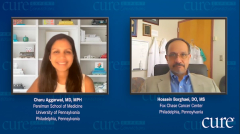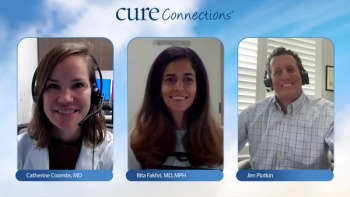
Education on NSCLC Symptoms and Risk Factors
Approaches that can help lung oncologists discuss symptoms and risk factors of non-small cell lung cancer with patients and their loved ones.
Episodes in this series

Charu Aggarwal, M.D., MPH: With regard to any symptoms or risk factors that patients should be aware of, do you routinely counsel not just patients, but their family members and caregivers?
Hossein Borghaei, DO, MS: The biggest risk factor we like to review is smoking and secondhand smoke. That’s an issue that we still have to deal with in our clinics. We all realize that a fair number of patients we now see with a diagnosis of lung cancer are never-smokers, so talking about a specific risk factor in that area has been a little more challenging.
But for patients who are smokers, we have efforts at our center where we can introduce patients to a tobacco treatment program and try to provide counseling and other help as much as possible. We sometimes even do pharmacological interventions and drugs with appropriate monitoring to educate our patient population and their families regarding the risks of lung cancer and tobacco consumption. With patients who have occupations where they might be exposed to either toxins or other environmental factors, it’s also important to have a discussion regarding safety at work and make sure some of those are at least discussed.
One area where I don’t have a clear answer, and I’m sure you’ve also received this call, is what to do with patients who are not necessarily smokers themselves or not living with a smoker, but have parents or family members who have been diagnosed with lung cancer, and are now worried about their own risk. We haven’t been able to come up with a really good method of providing help and screening for this patient population, because the majority of them—because they aren’t smokers, or tend to be younger—don’t qualify for a lung cancer screening program based on the current rules. That’s an area where I’m getting more and more requests for evaluation, and I’m not sure what guidelines there are that we can use for that patient population.
Transcript edited for clarity.

